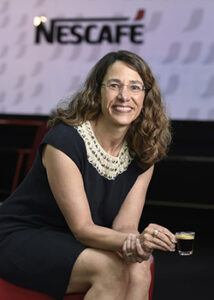Everything we do at Nestlé is rooted in our core values of respect: respect for people, respect for the planet, and respect for diversity and difference of thought. Nestlé has one of the most diverse consumer bases of any company, with activities in nearly 200 countries globally. There is no way to understand that consumer base if we do not embrace diversity in our operations, looking at things from different perspectives to get the best outcome possible.
When I joined the executive board in 2019 I was conscious of how seriously the company takes its commitments to D&I and was excited to propel the D&I programme forwards. While I see my role more as a supporting force to the broader company initiatives, there is still a lot that a GC can do to help drive change.
It starts with being purposeful with your own team, asking: Is it diverse enough? Are we building the right culture? Are we benefiting from diverse thought and approaches? How do we know? Are we actively identifying areas where we might be short? If so, how can we fill those, whether through external hiring or searching harder within the organisation?
The freedom to speak up
To get the best out of your people, you need to create an environment where they feel free to speak up. This underpins more than diversity and inclusion. Business methodologies from Lean to Six Sigma teach us that when teams are empowered to speak up, they improve performance; likewise, the ability, freedom and trust to speak up can enable strong safety and compliance cultures. A culture that supports D&I also supports innovation and idea generation and. allows you to examine a problem or opportunity from multiple perspectives and ultimately find the most robust answer.

For a legal function, having the freedom to speak up is doubly important. An environment where people feel comfortable to express what they feel is ethical or the right thing to do enables my team to act as a guardian of our core values more effectively. Targets and metrics are important ways to measure progress, but they are not the end goal. Creating a welcoming and open culture should be the first concern of any GC.
I am also a big believer in creating a working environment where everyone can bring their full self to work and perform at their best. Ultimately, strong performance and inclusive, collaborative behaviours are the most valued and valuable to a complex multinational organization.
Not-so-hidden talent
For female lawyers, the advice I commonly give is to just be yourself. Don’t try to fit in a mould. Build on your strengths and use those strengths to create a more inclusive environment. Christie Smith, the former vice president of inclusion and diversity at Apple once said the most important thing you can do to promote diversity is to say hello. That is a very powerful idea. That one simple gesture creates an environment that is more inclusive in an instant.
Even if you are not in a leadership position you can be a leader in everyday circumstances. For example, if you notice there are people who haven’t had a chance to speak, you can create space for them and encourage them to give their views. That way we can all be leaders in creating an inclusive environment.
Beyond that, I am proud to support Nestlé’s goal of having at least 30% women among its top 200 managers by 2022. That is an ambitious goal, but our approach has been to say, “We have almost 300,000 employees globally; with more women at the top, we reinforce our inclusive culture, make Nestlé an even better company and contribute to shaping an equal society. All of this helps drive our business performance.”
When the UK introduced a similar target for female representation on UK company boards, it was a success. I remember one board chair commenting that it’s amazing how many qualified candidates you can find once you look. That is often the case: the talent is there, you just need to change how you are looking for it.
To succeed
The biggest step you can make as in-house counsel is to get out from behind your desk – even if it’s a virtual tour. You need to visit operations, understand the business rationale, and see how things work on the ground. Whether you’re at a mine, at a retail gas station, or in a supermarket. That gives you a more holistic perspective and allows you to contribute more meaningfully, not only in a legal sense but in a broader commercial sense.
On an interpersonal level, it’s about asking yourself the right questions continuously: how you can help someone, how you can create space where people feel free to share their experiences and collaborate, or how you can share your knowledge and experience and open doors for people to progress their careers.
